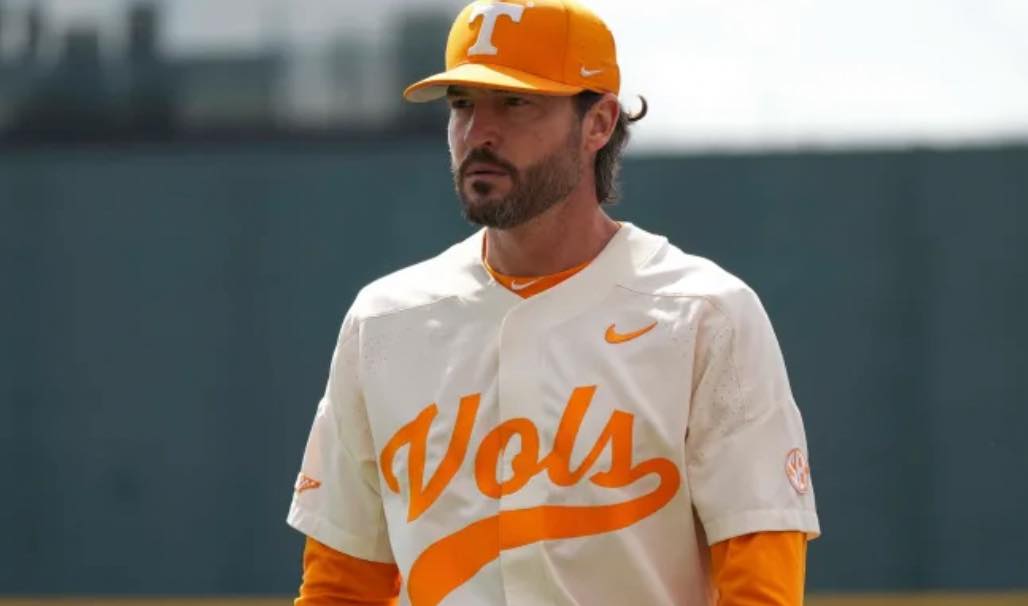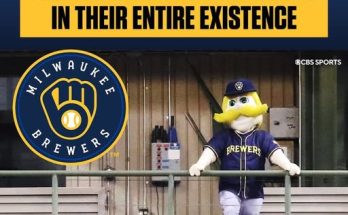The 2025 MLB Draft was one of the most talked-about sporting events of the year, not just for the incredible young talent selected but also for an unexpected figure who inadvertently found himself at the center of a heated controversy: Tennessee Volunteers baseball coach Tony Vitello. Known for his fiery passion, strategic acumen, and magnetic leadership on the college diamond, Vitello somehow managed to ignite rival fans’ ire during the draft — but surprisingly, it wasn’t because of any misstep on the field or any scandal. In fact, Tony Vitello didn’t do anything wrong at all. Yet the fallout was very real, and the story behind it is a fascinating window into the tangled web of college baseball loyalties, fan expectations, and the unpredictable nature of professional baseball.
Tony Vitello’s reputation in college baseball had been on a meteoric rise for years. Since taking the helm of the Tennessee Volunteers, he transformed the program into a powerhouse, bringing in top talent, cultivating a gritty team mentality, and leading the Vols deep into the postseason on multiple occasions. His coaching style was both intense and inspiring, earning him admiration from his players, respect from his peers, and a devoted fanbase that swelled every year. But college baseball is also a sport deeply entwined with local pride and rivalries that run as hot and fast as the pitches that fly across the diamond.
The 2025 MLB Draft brought all of those rivalries into sharp focus. For months leading up to the event, the draft was a buzz of speculation about which Tennessee players would hear their names called early and how those decisions would ripple through the college baseball landscape. Vitello’s program had produced a slew of draft-eligible talent, and the draft order itself was expected to be heavily influenced by the performances of these players in the recent collegiate season. As the draft unfolded, the world watched as teams picked players who would soon become household names — or college legends — depending on how their careers panned out.
But what exactly did Tony Vitello do that had rival fans so worked up? The short answer: nothing directly. The longer, more complex answer is tied to how Vitello’s success indirectly shaped the draft, how his public statements were interpreted, and how rival fanbases projected their frustrations onto him amid a high-stakes, emotionally charged atmosphere.
The first source of tension was Vitello’s outspoken enthusiasm for his players during the draft. While it’s common for coaches to cheer on their athletes, Vitello went above and beyond, live-tweeting praise, engaging with media, and vocally endorsing the potential of his draftees. This alone might not have been controversial, except for the timing and tone. Rival fans saw his exuberance as gloating, especially when players from competing programs were picked later or overlooked. To Vols supporters, Vitello was simply doing his job — advocating for his team — but to rival fanbases, this was perceived as rubbing salt in the wounds of their own disappointing draft outcomes.
More importantly, Vitello’s presence at the draft venue became a lightning rod. Unlike many college coaches who maintain a low profile during the MLB Draft, Vitello was front and center. His confident demeanor and close interaction with scouts and MLB executives suggested a level of influence some rival fans felt was unfair. Rumors swirled — largely fueled by social media and fan forums — that Vitello had pulled strings behind the scenes, lobbying hard for his players to be drafted higher than they might have been otherwise. Of course, there was no concrete evidence of this; Vitello’s reputation is built on integrity and professionalism, not underhanded dealings. Still, perception can be just as potent as fact in the world of sports rivalries.
Another element adding fuel to the fire was how Vitello’s players performed immediately after being drafted. Several Vols prospects who had been selected earlier than many expected quickly demonstrated why Vitello had advocated so strongly for them. Their early success in minor league camps and spring training only intensified rival fans’ resentment. They argued that these players were “overhyped” and that Tennessee’s system unfairly polished raw talent, creating an advantage that other programs lacked. This narrative, while rooted partly in envy, overshadowed the reality that Vitello and his coaching staff simply excel at player development, recruitment, and preparation.
Meanwhile, the ripple effects extended far beyond Tennessee’s fanbase. Rival fans and analysts from powerhouse programs in the SEC and beyond started debating whether Vitello’s approach to the draft was a new kind of strategy — one that blended college coaching with a proactive role in the professional scouting world. This, in turn, sparked broader discussions about the evolving role of college coaches in the player pipeline to the MLB. Should coaches be more involved in advocating for their players? Does that cross an ethical line, or is it simply good advocacy? And if a coach does so with the flair and personality of Vitello, does that make them a hero or a villain in the eyes of opposing fans?
All of these questions swirled during and after the 2025 draft, magnifying the emotions and heightening rivalries. Social media became a battlefield where Vols supporters and rival fans clashed over Vitello’s role and whether the players’ success was earned or engineered. Heated Twitter threads, passionate Reddit discussions, and viral TikTok clips dissected every moment of Vitello’s public draft presence. For a man who never intended to stir controversy, this was an unintended byproduct of his dedication to his players and his team’s future.
It’s worth noting that Vitello’s relationship with the media during the draft also played a part in the controversy. He was refreshingly candid in interviews, never shying away from talking about his players’ potential or the program’s trajectory. Some media outlets framed his enthusiasm as a confident coach celebrating hard work and talent, but others spun it as arrogance or unsportsmanlike conduct. These contrasting portrayals added fuel to the fire, giving rival fans more ammunition to voice their frustrations.
Interestingly, the controversy also highlighted the sometimes unrealistic expectations rival fans place on college baseball coaches. Many fans want coaches to be strictly focused on college play, with no perceived involvement or influence in professional drafts. But in today’s interconnected sports environment, the lines are blurred. Coaches like Vitello who embrace their role as mentors and advocates for their players inevitably draw attention — positive and negative alike — when those players transition to the pros.
Tony Vitello himself has responded to the controversy with characteristic grace. In interviews after the draft, he downplayed the drama, emphasizing that his sole focus was always on helping his players reach their potential — whether that’s in Knoxville or on an MLB diamond. He reiterated that the draft process is complex and driven by scouts and teams, not coaches, and that he was simply proud to support his players through that journey. His humility in the face of criticism endeared him even more to Tennessee fans while frustrating rivals who were hoping for a different narrative.
From a broader perspective, the 2025 MLB Draft controversy surrounding Vitello also sheds light on how passionate and personal college baseball rivalries have become. Fans today are more engaged, more connected through social media, and more invested in every aspect of their programs’ success. When a coach like Vitello elevates his program to national prominence, it disrupts the status quo, and rival fans respond with intensity that reflects both admiration and jealousy. The draft, in this case, became a proxy battleground for those feelings.
Looking ahead, the fallout from the 2025 MLB Draft may well influence how college coaches handle their public involvement in professional drafts going forward. Vitello’s example shows that visibility and advocacy can bring attention and pride — but also controversy and scrutiny. Future coaches may have to navigate this delicate balance carefully, learning lessons from Vitello’s experience about managing perception as much as supporting talent.
In the end, Tony Vitello’s role in the 2025 MLB Draft saga is a testament to how intertwined college baseball and professional baseball have become. Coaches are no longer just college strategists; they are mentors, promoters, and sometimes inadvertent lightning rods for fan passion. While rival fans may have been fuming, the core truth remains: Vitello did nothing wrong. He simply did what great coaches do — championed his players and celebrated their hard-earned success. And in a sport defined by rivalry and emotion, that’s sometimes enough to stir the pot, even if you never meant to.



